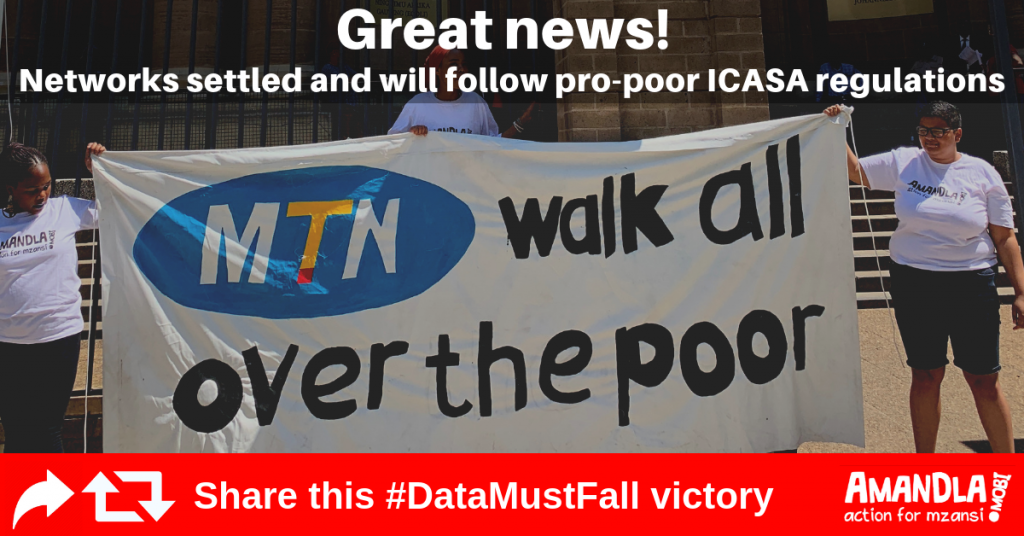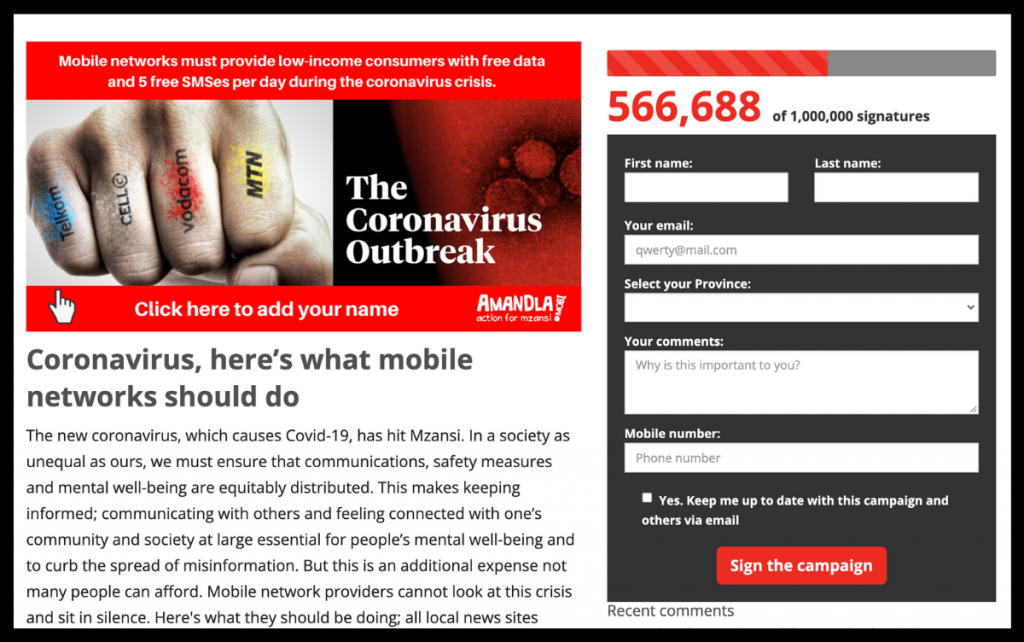Internet access changed the world but excluded the poor. The very people who would benefit the most from access to the information, education, jobs and income the internet has helped unlock.
To challenge this digital divide, amandla.mobi has worked to amplify the collective voices of Black women from low-income backgrounds by turning every cell phone into a democracy-building tool.
Our Data Must Fall campaign saw our campaign supporters organise their communities, and together we petitioned, protested and sent public submissions. Our campaign eventually secured victories such as pro-poor regulations that benefited over 30 million pre-paid users [1]. The campaign also resulted in an agreement with the mobile networks to reduce the cost of some of their data bundles by 30% to 50%. This reduced the cost of mobile internet for over 13 million people in South Africa [2].
We launched our Data Must Fall petition in 2016 and helped get the attention of our leaders. In February 2017, President Jacob Zuma announced that reducing the cost of data was a priority. We continued to build public pressure until both our communications regulator ICASA and our Competition Commission, announced they would be looking into high data prices.
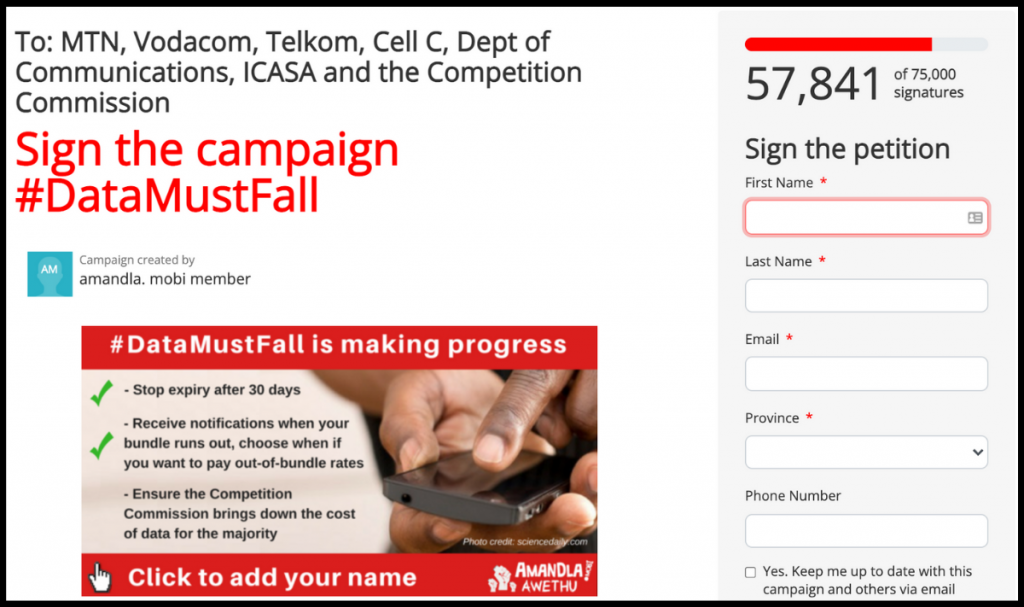
Working with campaign supporters, we began to escalate campaign tactics. Campaign supporters started knocking on doors, putting up posters and collecting stories about how high data prices impacted peoples lives.
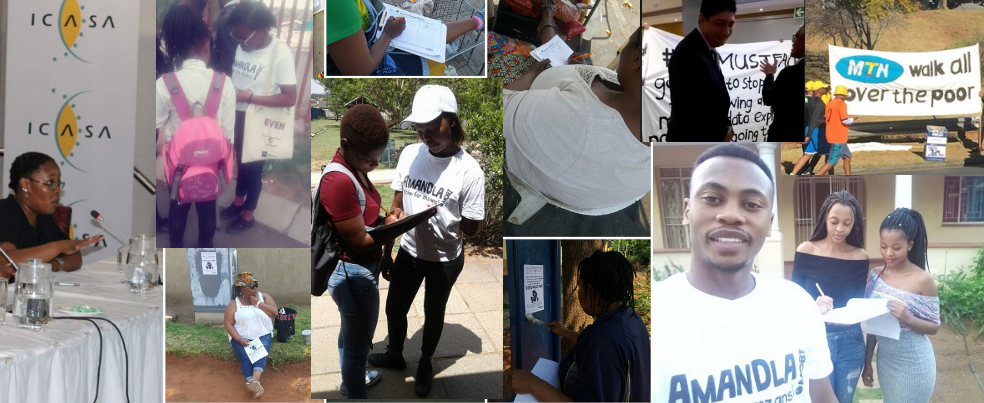
We started to win. During public hearings at ICASA we played WhatsApp voice note testimonies from campaign supporters.
Breaking! #DataIsFalling @ICASA_org released their final regulations. Thnx 2 the 30,000 https://t.co/VF64hUKC9G members who did submissions, petitioned, organised + donated to support our #DataMustFall campaign. This is a 1st step, but the campaign continues! #DataCosts #Icasa pic.twitter.com/sJbECLZWh7
— Amandla! (@AmandlaMobi) April 26, 2018
Together with Indra de Lanerolle, a Visiting Researcher and adjunct lecturer at the University of the Witwatersrand, we presented evidence and testimony that mobile networks were charging the poor the highest data prices, entrenching digital and economic inequality. People such as the CEO of Vodacom soon found themselves hauled in front of the commission to explain.
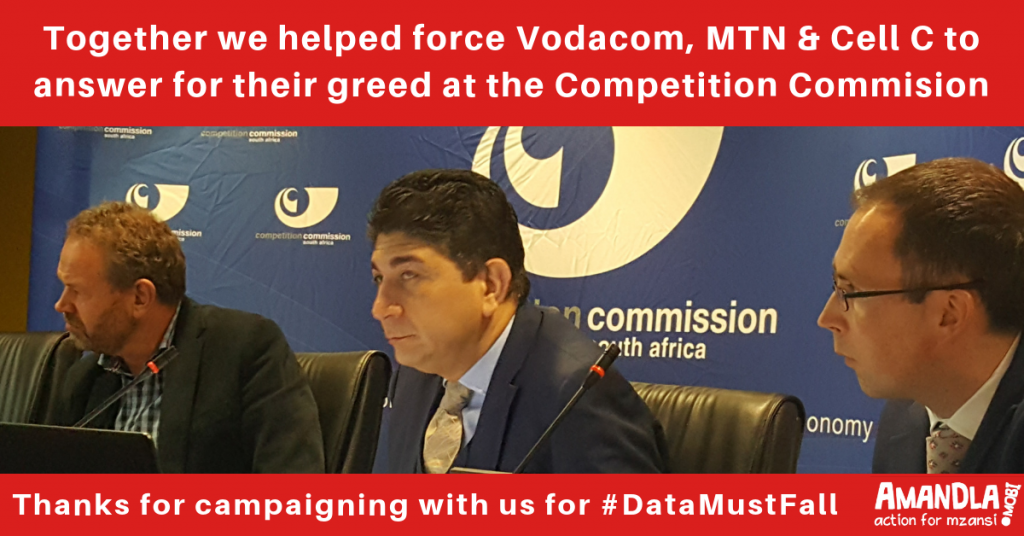
But mobile networks struck back and took legal action against ICASA and amandla.mobi. But thanks to an amazing pro-bono lawyer, and public pressure to name and shame mobile networks, the case was settled.

The campaign elevated the voices and experiences of low-income consumers which began shaping the public agenda. The Competition Commission slammed mobile networks for their anti-poor pricing.
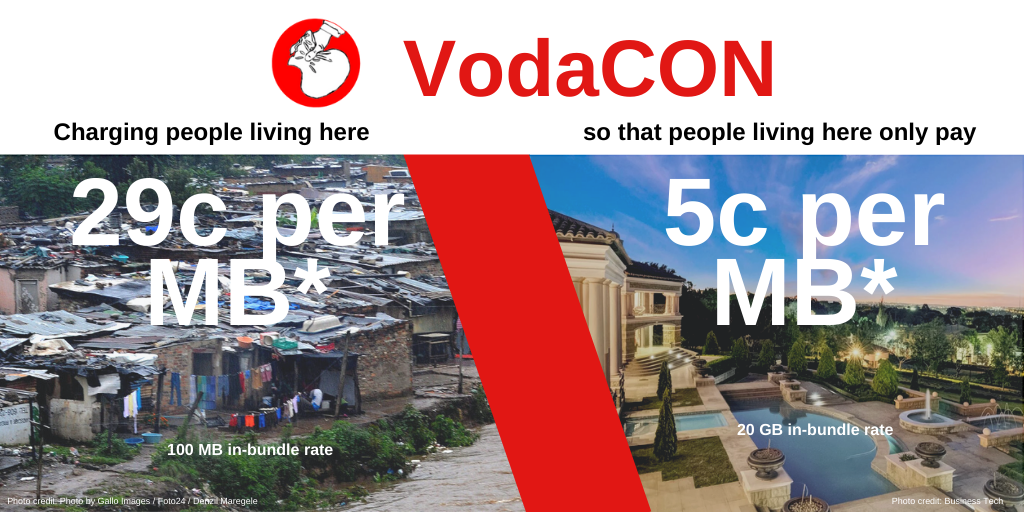
#DataMustFall campaign update. Our voices were heard. Mobile networks have until June to respond to the Competition Commission provisional report, so stay tuned for campaign updates from us. pic.twitter.com/Ryiu4lz6LJ
— Amandla! (@AmandlaMobi) April 25, 2019
In their final report, the Competition Commission gave the two largest mobile networks, Vodacom and MTN, until February 2020 to reduce their data prices by between 30% to 50%.
Vodacom, the largest mobile network announced that from 1 April 2020, a 1GB data bundle cost would be cut from R149 to R99. This was yet another important campaign victory, but our work was not over.
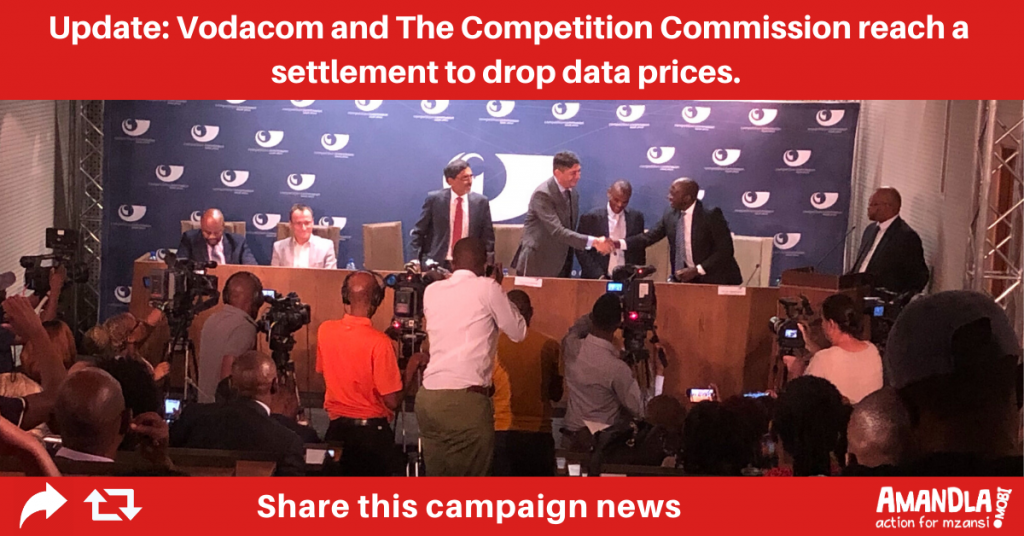
Although Vodacom has reduced its data prices, it does not mean it is now cheap. Data prices need to fall further. #DataMustFall pic.twitter.com/AkNQDAAw2J
— Amandla! (@AmandlaMobi) March 24, 2020
When COVID-19 hit, we knew it was critical to counter misinformation by calling on mobile networks to make accessing news sites free, as well as providing free data and SMS so low-income consumers could keep in touch with loved ones. The petition went viral on our mobile platform, and over half a million people were able to add their name without accessing the internet or having an email address.
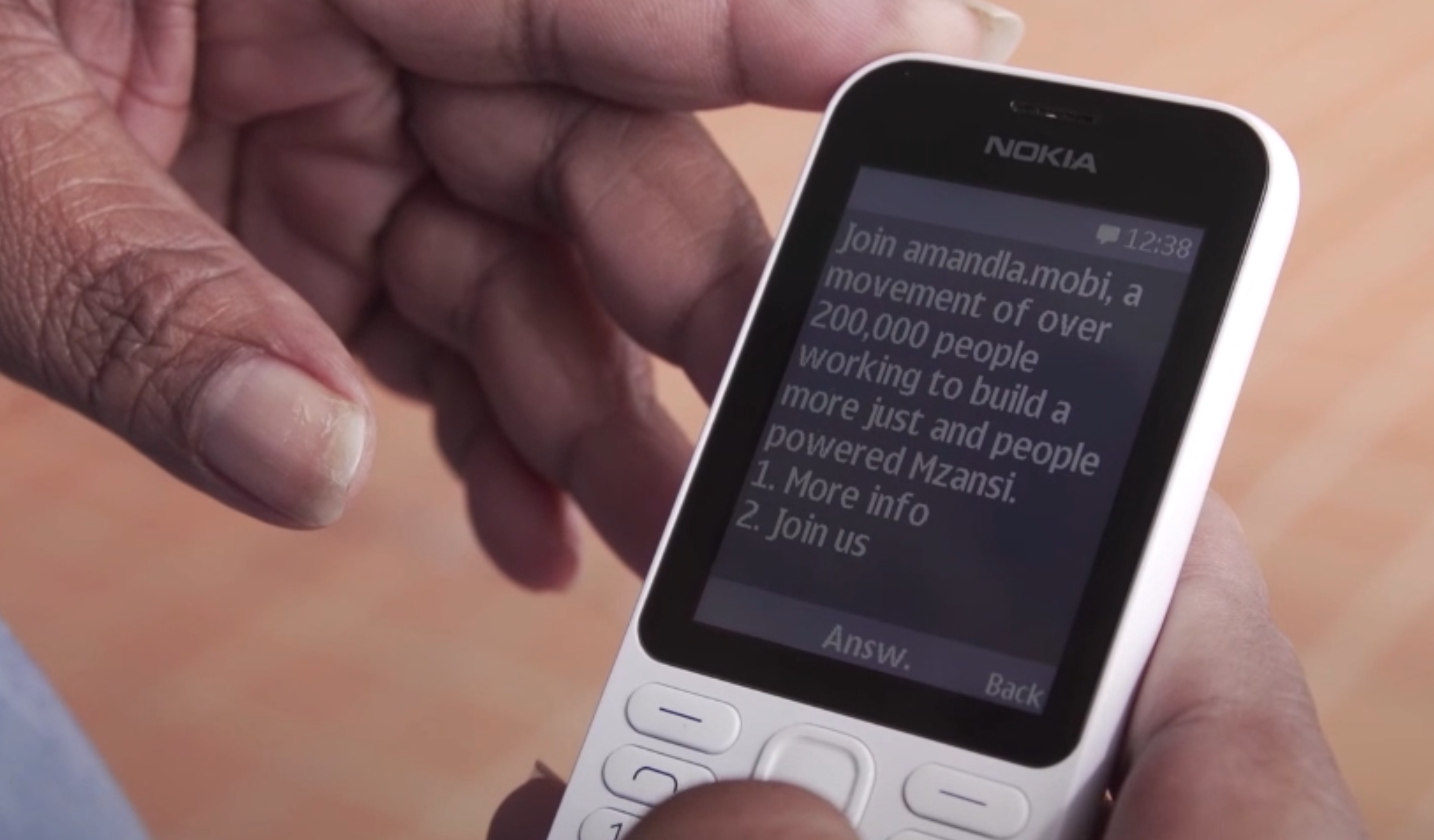
Our Data Must Fall campaign continues to this day. We are currently working with campaign supporters to crowdsource data and testimony to monitor the implementation of pro-poor regulations and agreements. We have already begun to identify some loopholes that mobile networks are using to undermine some of our campaign wins. While our work continues, the momentum and impact to date show how the power of amplifying the collective voices of Black women from low-income backgrounds.
[1] This figure is based on rough calculations. We detail our sources and calculations below. According to reporting on mobile networks’ total number of subscribers and number of pre-paid subscribers, we calculated that around 86.3% of mobile users were pre-paid rather than contract (post-paid). The most recent report we could find on the number of individual adults using cell phones in South Africa is from a 2015 MMA report in 2015 which suggests there were 38.3 million adults in South Africa using a cell phone. ICASA’s pro-poor regulations came into force from 1 March 2019. These regulations forced mobile networks to send SMS notifications when a user’s voice, SMS or data bundle they have purchased is going to be depleted. These regulations impacted pre-paid consumers. If there were 38.3 million adults using cell phones in South Africa in 2015, and 86.3% of users were pre-paid users in the 2019-2020 period, a conservative estimate of the number of pre-paid cell phone users who benefited from the regulations is over 33 million people. While it is older research, research from 2015 suggests the following of these pre-paid users around 16 million of these users are estimated to be women and 26 million Black. While far from perfect, we estimate a conservative figure of 11 million Black women from low-income backgrounds, have been impacted by this campaign win. Again this is a conservative figure but it gives us a figure we are relatively confident is not overstating our impact.
[2] According to the Competition Commission’s Data Services Market Inquiry Report published in December 2019, there are an estimated 20.4 million people in South Africa accessing the internet via smartphones. Smartphones are not the only type of cell phone that can access the internet, feature phones are able to as well. However, their market share has gone down, and we cannot find any recent data on the number of individual feature phone users or users of so-called ‘brick’ phones that have no internet access functions at all. We will, therefore, only include smartphone users who benefited from data prices dropping, as we don’t have data on the number of feature phone users who would have also benefited. As a result, our calculations likely underestimate rather than overestimate the number of people impacted. Using the estimate of 20.4 million people using smartphones and applying the 86.3% of mobile users being pre-paid, a conservative estimate of the number of smartphone users impacted by ICASA’s pro-poor regulations to limit data bill shock would be around 17.6 million. When MTN and Vodacom reached an agreement with the Competition Commission that they would reduce the cost of some of their data bundles by 30% to 50%, these two mobile networks made up 74% of the total number of pre-paid users. So 74% of 17.6 million pre-paid smartphone users is 13 million.

